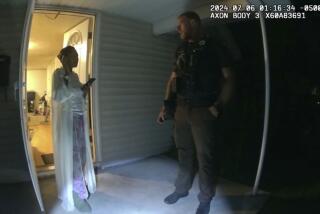Officer in Albuquerque killing figured in 2011 shooting
The latest Albuquerque police officer to fatally shoot a suspect was caught in a lie three years ago during the case of another officer implicated in a deadly shooting, according to an attorney and sworn testimony.
In 2011, Officer Jeremy Dear told a police investigator that he saw the suspect, Alan Gomez, holding a cigarette and standing in front of his house talking with police, according to federal court records. Gomez was a suspect in a hostage situation and was considered armed. When he turned to go back in the home, an officer fired, considering Gomez to be a threat to the people inside.
During a deposition five months later for a wrongful-death lawsuit lodged by Gomez’s family, Dear said he saw something larger, possibly a gun, in Gomez’s hand. But when attorney Joseph Fine, representing Gomez’s family, played the audio recording of the moment before the shooting — all captured by Dear’s uniform-mounted camera, Dear acknowledged that he told the shooting officer that the victim’s hands were not visible.
Gomez’s family received a $900,000 settlement from the city this year.
Dear is now under investigation for fatally shooting Mary Hawkes, 19, who was suspected of driving a stolen pickup early Monday.
On Wednesday, Police Chief Gorden Eden Jr. told reporters that the department tried but failed to retrieve video of the shooting from Dear’s on-body camera.
“We know the technology is not 100% foolproof,” he said.
Department policy requires the on-body cameras, typically mounted on shirt lapels, to be switched on during all interactions with the public. Police are increasingly turning to the technology to reassure the public about their actions and to help defend the department in lawsuits against officers.
Dear’s device was sent for analysis to the manufacturer, which has produced video in the past when the department’s tech experts could not, the chief said.
Eden said he didn’t know whether Dear’s camera was on.
“There are consequences for not turning it on, which can include letter of reprimand to suspension,” Eden said. “I don’t want to try to draw any conclusions on what will happen.”
Since 2010, Albuquerque officers have shot 37 people, including three in the last five weeks. Twenty-three of the shooting victims have died, leading to millions of dollars in legal payments.
Two weeks ago, the Justice Department concluded that the city’s officers were too quick to resort to lethal force and unnecessarily put themselves in precarious situations. Federal and local officials are working on a plan to keep the department under watch and improve training for officers.
Fine said Wednesday that Dear was never investigated for his conflicting statements in the Gomez case.
The department declined to comment and could not immediately provide records about Dear’s reprimand history.
“One officer covering for another is not unique, and I think Officer Dear not being taken to task for not telling the truth is not unique,” Fine said.
Also in the Gomez case, the city initially said that it couldn’t find the audio recording of Dear’s interview with police. A federal magistrate then issued a preliminary order allowing Fine to tell jurors that the city negligently lost the audio. The next day, Fine received the recording.
“Even if officers were concerned that Gomez might have been going back to harm the individuals inside the house, that risk of future harm was not enough to justify the near certainty of Gomez’s death from the firearm discharge,” the Justice Department wrote in its rebuke of the Albuquerque force.
The lack of immediate video in the latest officer-involved shooting leaves the circumstances in question in the eyes of skeptical residents, who have protested what they regard as the department’s culture of lethal force.
Eden said that the woman drew a gun on Dear as he pursued her near a trailer park. Hawkes, the foster daughter of a retired county judge in New Mexico, had prior convictions for shoplifting and drinking in public.
Hawkes died at the scene, and police recovered a .32-caliber pistol next to her body, Eden said. She was the first woman killed by officers in about 10 years.
“It’s not every day that a police department kills a 19-year-old that looks like she weighs 100 pounds,” said Shannon Kennedy, another attorney who has challenged the department’s use of force. She said the community has been pleading with the Justice Department to order the city to fire officers engaged in a pattern of bad behavior.
“Some of them are simply not to fit to make split-second decisions about life and death,” Kennedy said.
More to Read
Sign up for Essential California
The most important California stories and recommendations in your inbox every morning.
You may occasionally receive promotional content from the Los Angeles Times.










